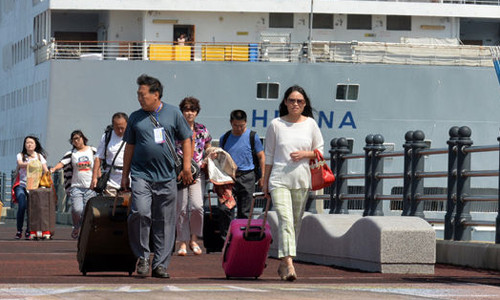Chinese people flock to Jeju Island
With an investment of $500,000, wealthy Chinese can be granted long-term residency visas on South Korea's largest island.
 |
| Chinese tourists visit Jeju Island, South Korea. Photo:NYTimes |
More than 1,000 Chinese citizens have been granted long-term residency on South Korea's tourist island of Jeju, after spending a large sum of money investing in real estate in the area.Korean Timesrecently reported.
According to global real estate consultancy JLL, 99% of applicants for long-term residency on Jeju Island under a program to attract foreign investors are Chinese citizens, as the island is less than an hour's flight from China. There are currently 1.8 million long-term foreigners residing in South Korea, mainly through labor cooperation and marriage.
"The rules of this program are quite simple: foreigners will receive Korean citizenship when they spend more than 500,000 USD to buy an apartment in an area reserved for foreign investors, much higher than the average house price in Jeju of 140,000 USD," said Mr. Yongmin Lee, head of research at JLL Korea.
According to the South Korean Ministry of Justice, since March 2015, 1,007 foreigners have applied to settle in Jeju under the investment program, including 992 Chinese. According to statistics, out of 10 Chinese investors settling in the island, 6 are aged between 40 and 59, and most of them come from the richest cities in China.
According to many experts, Jeju's investment requirements are much lower than many other places in the world, so it attracts the attention of many Chinese. Accordingly, foreigners who invest more than 500,000 USD and hire more than 5 local workers will be granted a permanent residence visa F5. Homebuyers will be granted a temporary residence visa F2, and they can upgrade to F5 after 5 years.
The settlement program was launched by the Jeju government in 2010 after being approved by the Ministry of Justice, aiming to stimulate foreign investment in the island. Four other Korean localities have also adopted similar policies.
Many Chinese are interested in Jeju not only because of its geographical proximity, but also because of the island's natural environment, as well as the stagnation of the Chinese real estate market and the demand for overseas housing among many wealthy Chinese.
 |
Luxury apartment complex on Jeju Island. Photo: Pinterest |
Since 2012, China’s largest real estate group Greenland has been investing in Jeju’s Chinese-only apartment market. Despite the high prices, these apartments have attracted huge demand and achieved a very high deposit rate, according to JLL.
However, the settlement program has also raised concerns among locals about the overdevelopment of foreign areas, and it has recently become a controversial political issue on the island.
In mid-2014, new Jeju Mayor Won Hee-Ryong ordered a review of construction permits for major projects on the island, causing some of Greenland's projects to be delayed.
These challenges have not deterred a wave of Chinese investment in Jeju Island before the program expires in 2018. "With the boom in Chinese tourism showing no signs of stopping, there are many development opportunities around foreigner zones such as hotels, casinos, restaurants and entertainment venues," Mr. Lee said.
According to VNE
| RELATED NEWS |
|---|



